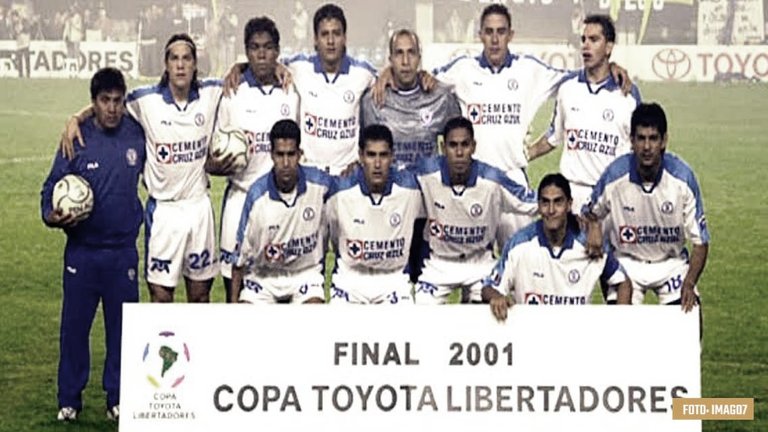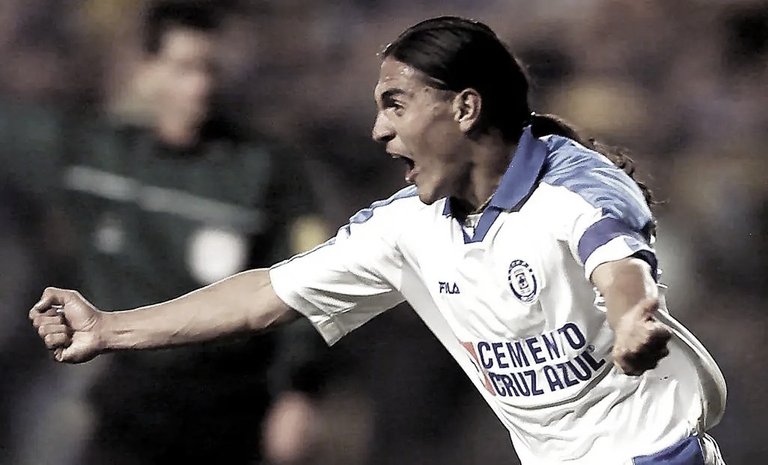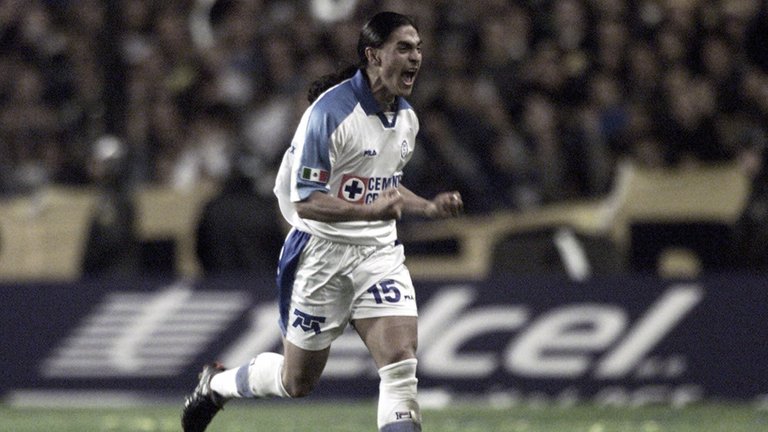CRUZ AZUL Y UN SUEÑO LIBERTADOR [ESP/ENG]

"Para mí fue muy importante ese estímulo que nos metía el rival, yo me acuerdo que el portero del Táchira nos decía 'pero ustedes qué hacen si no van a pasar de la primera ronda', nos lo decían todos, lo decía con una soberbia. Nosotros sabíamos a qué jugábamos, pero yo creo que ese estímulo se necesita siempre. Ellos creían que nos estaban hundiendo, pero en realidad nos estaban estimulando, y nuestra confianza creció." – Paco Palencia recordando aquella aventura de la Copa Libertadores.
"I remember the Táchira goalkeeper saying to us 'what are you doing if you're not going to get past the first round', they all said it to us, he said it with such arrogance. We knew what we were playing for, but I think that encouragement is always needed. They thought that they were bringing us down, but in reality, they were encouraging us, and our confidence grew". - Paco Palencia recalling that Copa Libertadores adventure.

El cambio de siglo, este, uno ya no tan nuevo pero que vamos viviendo como si lo fuera, un siglo lleno de conflictos y tensiones, el siglo de una nueva pandemia (la de mayor alcance geográfico en la historia); en aquel 2001 era apenas un siglo en ciernes, un bebé en panales que apenas balbuceaba toda esa historia que habría de venir.
Para aquel entonces esta máquina celeste en la que hoy centraremos nuestra atención no conocía aún la tan compleja sequía de títulos que su futuro dictaría -una sequía recientemente rota- y más bien soñaban con conquistar la gloria continental. Sí, hubo un tiempo en el que el nivel del futbol mexicano daba para competir en el Sudamérica, hubo un tiempo, también, en que los intereses económicos de la CONCACAF como organismo no lo impedían. Para México, a nivel competitivo, eran tiempos mejores y no lo sabíamos.
Nombres como el de Óscar “el Conejo Pérez” bajo los postes, Melvin Brown, Pablo Galdames, Angél “el Matute” Morales, el brasileño Pinheiro, Héctor “el Ruso” Adomaitis son piezas inolvidables de aquella expedición azul en busca del sueño continental; pero saltan dos nombres con mucho mayor peso para mí, primeramente el de José Saturnino Cardozo -cedido por el Toluca para reforzar a la Máquina- y por encima de todos el de Juan Francisco Palencia y sus rockeras pintas.
The turn of the century, a century that is no longer so new but which we are living as if it were, a century full of conflicts and tensions, the century of a new pandemic (the one with the greatest geographical scope in history); in that 2001 it was barely a century in the making, a baby in the honeycomb, barely babbling all that history that was to come.
At that time, the sky-blue machine on which we will focus our attention today did not yet know the complex drought of titles that their future would dictate -a drought recently broken- and rather dreamed of conquering continental glory. Yes, there was a time when the level of Mexican football was good enough to compete in South America, there was also a time when the economic interests of CONCACAF as a governing entity did not prevent it. For Mexico, at a competitive level, those were better times and we didn't know so.
Names such as Oscar "el Conejo Pérez" under the posts, Melvin Brown, Pablo Galdames, Angél "el Matute" Morales, the Brazilian Pinheiro, Héctor "el Ruso" Adomaitis are unforgettable pieces of that blue expedition in search of the continental dream; but two names stand out with much more weight for me, firstly that of José Saturnino Cardozo -loaned by Toluca to reinforce La Máquina- and above all that of Juan Francisco Palencia and his rocker looks.
Cuando el Estadio Azteca se pintó de azul para apoyar al Cruz Azul en la Copa Libertadores del 2001 💙🚂 pic.twitter.com/M1kjJDdg6h
— SoyReferee (@SoyReferee) December 31, 2021
La Máquina Celeste de la Cruz Azul había conquistado su último título liguero en el torneo Invierno 1997, pero fue invitada por CONMEBOL a participar de la Copa Toyota Libertadores. Su camino en dicha contienda comenzaría en la fase denominada “Pre Libertadores” en ella hubo de competir contra los Potros de Hierro del Atlante -hoy en Liga Expansión (2ª División en México)-, Deportivo Táchira y Deportivo Italchacao -ambos venezolanos-. Los celestes se hicieron del primer puesto de aquella fase previa y avanzaron junto al Deportivo Táchira (2º puesto) a la fase de grupos del torneo más prestigioso del continente.
Su fase de grupos no fue menos que fulgurante, el conjunto mexicano recaló en el Grupo 7 de aquella edición junto con el Sao Caetano brasileño, el Defensor Sporting uruguayo y el Centro Deportivo Olmedo de Ecuador. Los celestes lideraron su grupo con 4 victorias, 1 empate y un descalabro para así cosechar 13 puntos, 5 más que el Sao Caetano -segundo clasificado-.
La Máquina Celeste de la Cruz Azul had won their last league title in the Invierno 1997 tournament, but were invited by CONMEBOL to participate in the Toyota Libertadores Cup. Their journey in that competition began in the so-called "Pre Libertadores" phase, where they had to compete against Atlante -now in Liga Expansión (2nd Division in Mexico)-, Deportivo Táchira and Deportivo Italchacao -both Venezuelan teams-. The Celestes took first place in that preliminary phase and advanced along with Deportivo Táchira (2nd place) to the group stage of the continent's most prestigious tournament.
Their group stage was nothing short of dazzling, the Mexican side were drawn in Group 7 of that edition along with Sao Caetano of Brazil, Defensor Sporting of Uruguay and Centro Deportivo Olmedo of Ecuador. Los Celestes topped their group with four wins, one draw and one loss to collect 13 points, five more than second-placed Sao Caetano.

Aquel Cruz Azul tenía su atractivo, algo en su aura hacía que gran parte de la afición al futbol en México dedicara un pedacito de su alma y corazón a apoyarle en la justa continental. No importaba si era del América, del Guadalajara, de Pumas o de algún otro, cada tarde o noche de Libertadores, eras un poco hincha del Cruz Azul -en mi caso no era la excepción- 11 añitos de edad y aquel Cruz Azul, cuyos partidos seguía atentamente de la mano de mi padre, era objeto de mi apoyo; mi americanista corazón cedió un poquito de su amor para dar cabida a los Celestes.
La fase final de Cruz Azul no sería menos emocionante y ni por asomo menos lustrosa que su camino previo: La primera parada, la de octavos de final, lo enfrentaba al Cerro Porteño de Paraguay; Cruz Azul caería por 2-1 en territorio guaraní, pero supo rehacerse en el juego de vuelta para ganar 3-1 y así acceder a los cuartos de final que lo enfrentarían a un histórico de la Copa. Resistieron en su visita al Monumental de Buenos Aíres, hicieron partido a todo un River Plate en su casa y el 0-0 prevaleció, pero para la vuelta en el Estadio Azteca los celestes despedazaron al Gigante como David lo hiciera con Goliat. 3-0 lo ganó la Maquina a River y avanzaba así a las semifinales que lo enfrentarían a otro histórico argentino, Rosario Central, 2-0 lo ganaron en el Azteca para plantar cara con un 3-3 en el juego de vuelta en “el Gigante de Arroyito”.
That Cruz Azul had its appeal, something in its aura made a large part of the Mexican football fans dedicate a little piece of their heart and soul to support them in the continental competition. It didn't matter if they supported América, Guadalajara, Pumas or some other team, every afternoon or night of the Libertadores, they were a bit of a Cruz Azul fan - in my case I was no exception - 11 years old and that Cruz Azul, whose matches I followed hand in hand with my father, was the object of my support; my americanista heart gave up a little bit of its love to make room for the Celestes.
Cruz Azul's final phase would be no less exciting and by no means less lustrous than their previous path: the first stop, the round of 16, faced Cerro Porteño of Paraguay; Cruz Azul would lose 2-1 on Guarani soil, but were able to bounce back in the second leg to win 3-1 and thus reach the quarter-finals, where they would face a historic team of the Cup. They resisted in their visit to the Monumental in Buenos Aires, they matched River Plate at their home ground and the 0-0 draw prevailed, but for the second leg at the Azteca Stadium the Celestes tore the Giants to pieces like David did with Goliath. La Maquina beat River 3-0 to advance to the semi-finals against another historic Argentinian side, Rosario Central, 2-0 at the Azteca and then held on for a 3-3 draw in the second leg at "el Gigante de Arroyito".
Fueron líderes de grupo. En octavos, le remontaron a Cerro Porteño. En cuartos, golearon a River. En semis, vencieron a Rosario Central. El primer equipo mexicano que se metió a una FINAL de Copa Libertadores. El histórico Cruz Azul de José Luis Trejo. 2001.
— Invictos (@InvictosSomos) June 21, 2020
📷 @CruzAzulCD pic.twitter.com/Xg5zwFshNv
Los celestes estaban instalados en la final, pero en frente tenían a uno de los mejores equipos de Boca Juniors en la historia reciente, el Boca del “Virrey” Carlos Bianchi. Los Xeneizes conquistaron el Azteca con un gol del “Chelo” Delgado al 79’, pero aún con ello a todos nos inundaba la sensación de que aquel Cruz Azul podía hacer historia. En la Bombonera bonaerense, Paco Palencia nos hizo creer al 45’ y hubo que ir a los fatídicos penales que coronaron a Boca.
Aún con la derrota a cuestas, aún sin haber podido fraguar el sueño continental, aquel Cruz Azul se ganó el respeto de todo el continente y el cariño de casi todo México cuando por 90 minutos entre semana iban escribiendo una epopeya en la que al final, como Leónidas y sus 300 ante el ejército de Jerjes I, terminaron sucumbiendo. Aquella celeste epopeya será siempre recordada.
The Celestes were in the final, but they were up against one of the best Boca Juniors teams in recent history, the Boca of "Virrey" Carlos Bianchi. Los Xeneizes conquered the Azteca with a goal by "Chelo" Delgado in the 79th minute, but even so, we all had the feeling that Cruz Azul could make history. At the Bombonera in Buenos Aires, Paco Palencia made us believe at 45' and we had to go to the fateful penalties that crowned Boca.
Even with the defeat behind them, even without having been able to forge the continental dream, that Cruz Azul won the respect of the whole continent and the affection of almost all of Mexico when for 90 minutes during the midweeks they were writing an epic in which in the end, like Leonidas and his 300 against the army of Xerxes I, they ended up succumbing. That Celestial epic will always be remembered.
Las acciones de aquella final que coronaría a Boca:
The actions of that final that would crown Boca.:
✍🏼: Paco Andújar ⚽